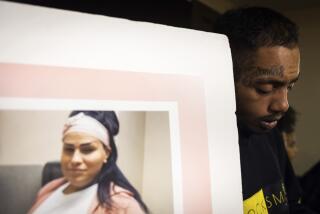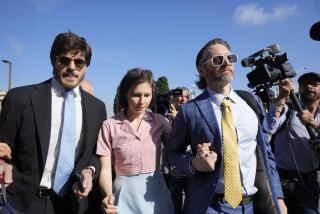Ex-Crenshaw High football star gets life for killing witness’ mother
- Share via
A high school football star, whose talents on the playing field once seemed certain to carry him out of South Los Angeles, was sentenced Tuesday to life in prison without the possibility of parole for murdering the mother of a girl who was set to testify against him in a robbery case.
The sentencing of Tyquan Knox, 23, came nearly five years after the January 2007 shooting, in which he was found to have strode up to Pamela Lark, 49, outside her home and shot her multiple times at close range as her grandchildren looked on.
In that time, prosecutors tried three times to convict Knox, once a standout wide receiver at Crenshaw High School who had attracted the attention of college recruiters from several top-tier schools.
The first two trials ended in hung juries before a jury convicted him in July. Knox is said to have killed Lark in an attempt to silence her daughter, Khristina Henry, then 17, who was planning to identify him in court days later as the man who had robbed her at gunpoint.
The sentencing hearing, which ran more than two hours, was marked by the deep sadness of Lark’s children, grandchildren, siblings and other relatives who spoke tearfully of missing the woman they described as generous and gregarious.
The morning turned tense when Knox, handcuffed and his legs shackled, defiantly spewed profanities at Lark’s sister as she began to speak and then turned his vitriol toward Los Angeles County Superior Court Judge Michael Pastor. The judge warned Knox that he would be removed from the room if the outbursts continued.
“I want him to know this all could have gone away with a simple apology after Khristina was robbed,” Lark’s sister, Karen Slider, told Pastor, her voice breaking. “If you had told Pam you were sorry … she would have forgiven you on the spot.”
Knox’s attorney said her client would appeal the conviction.
Several months before the killing, Henry had been robbed at gunpoint along with her boyfriend outside a bowling alley. The girl identified Knox as the assailant from a photographic lineup.
Over the next few months, Knox’s mother and other acquaintances contacted Lark and Henry, in what they took to be an attempt to dissuade Henry from testifying against Knox.
Knox had already missed his best opportunity to earn an athletic scholarship to college. During his senior year at Crenshaw High, he had been kicked off the football team after a physical altercation with a girlfriend.
Interest from recruiters dried up, and Knox joined the team at a local community college. He held on, however, to the hope that big-name football schools would once again take notice. An armed robbery conviction would have been the end to any such dream.
Four days before Henry was scheduled to testify against Knox at his preliminary hearing, a man wearing a hooded sweat shirt approached Lark in the parking lot at her Mid-City apartment. He demanded her purse and then opened fire without taking anything from her or from a niece who was standing nearby.
The killing and the ripple effects it had on the people it affected was the subject of a two-part series in The Times in 2009.
In the first two trials, Deputy Dist. Atty. Danette Meyers relied heavily on the testimony of Knox’s girlfriend Keeairra Dashiell, a top student at Crenshaw who was awarded a full scholarship to UC San Diego.
Accused of driving Knox to and away from the shooting, Dashiell was given a seven-year prison sentence in exchange for her testimony against Knox. Despite the deal, she was a hostile and unconvincing witness, who was found to have lied about a possible other suspect, Meyers said.
Meyers did not use Dashiell in the third trial and withdrew the offer of a deal. Now, Dashiell will be charged with Lark’s murder as well, Meyers said.
Sitting quietly in the back of the courtroom Tuesday was Michael Slider, Lark’s brother-in-law.
Slider, a veteran Los Angeles Police Department detective, was fired last year for leaking confidential information about the case.
Convinced that the detectives working on the robbery case had not taken threats against Henry and Lark seriously enough, Slider has admitted to passing on the information to an attorney the family hired.
An appeals court threw out one of the LAPD’s allegations against Slider and sent the case back to the department for reconsideration.
More to Read
Sign up for Essential California
The most important California stories and recommendations in your inbox every morning.
You may occasionally receive promotional content from the Los Angeles Times.














